Joint Commission on Economic Development-9/12/2021
Paul Ziemkiewicz, Director of the Water Research Institute at WVU, laid out a proposal to the committee suggesting that West Virginia’s long-standing acid mine draining problem, could be solved, at least in part, with a long-term economic driver.
The institute is assessing the feasibility of scaling up acid mine drainage treatment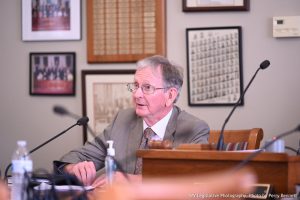 technology to support a nationwide supply chain of valuable rare earth elements and critical minerals.
technology to support a nationwide supply chain of valuable rare earth elements and critical minerals.
Ziemkiewicz said the goal is for the ability, not only to treat acid mine drainage and see the environmental improvements but also have a revenue stream coming back into the state. The institute is trying to treat acid mine drainage before it gets into rivers and streams while making money in the meantime.
He encouraged the commission to pass draft legislation that the Water Research Institute is developing with the state Department of Environmental Protection to clarify who owns the resources resulting from treated acid mine drainage. Acid mine drainage forms when pyrite is exposed and reacts with water and air to form sulfuric acid and dissolved iron, which can form the orange and red sediments in the bottom of streams.
The institute was awarded a $5 million grant in 2019 by the federal Department of Energy to scale up recovery of rare earth elements from acid mine drainage sludge. The work includes the construction of a facility at a new acid mine drainage treatment plant near Mount Storm.
“We’re working on a process to basically take your small acid mine drainage treatment systems and turn those into rare earth recovery units,” Ziemkiewicz said.
The acid mine drainage treatment plant is under construction and was initially scheduled to begin operations by November. The pandemic has delayed the delivery of needed materials and pushed the tentative completion date to January 2022.
The facility could treat 1,000 gallons of acid mine drainage daily. Nonvaluable solids removed during the clarification process would be pumped into storage plants, while valuable rare earth elements would be separated for further processing. The treated acid mine drainage then would be directed to the receiving stream.
Ziemkiewicz explained that rare earth elements are a group of 17 metallic elements whose magnetic, electrochemical, and other properties make them key components of cellphones, televisions, computer hard drives, and other electronic devices as well as defense applications, including lasers and radar, and sonar systems.
With the U.S. currently focusing on the rare earths market, Ziemkiewicz said, the time is now for such projects.
“We certainly want to have the central concentrate for the whole United States and hopefully central Canada and then this would be our major supply of rare earth elements and critical minerals for the United States,” Ziemkiewicz said. “It may sound grandiose, but what the heck? Think big, realize big.”
Legislative Oversight Commission on Workforce Investment for Economic Development-9/12/2021
The committee heard encouraging news during the meeting, as the unemployment rate and employment figures in West Virginia continue to recover from the coronavirus pandemic.
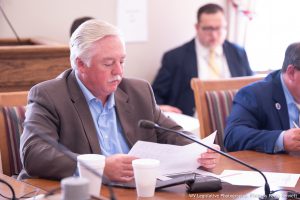 July’s (most recently available figure) unemployment rate in the state sat at 5 percent, below the current national rate of 5.2 percent. That figure is slightly down from 5.1 percent in June and significantly down from 6.1 percent in May. The state’s unemployment rate reached a high of 9.5 percent in July 2020, when large sectors of the economy were shut down in response to the pandemic.
July’s (most recently available figure) unemployment rate in the state sat at 5 percent, below the current national rate of 5.2 percent. That figure is slightly down from 5.1 percent in June and significantly down from 6.1 percent in May. The state’s unemployment rate reached a high of 9.5 percent in July 2020, when large sectors of the economy were shut down in response to the pandemic.
Addressing the committee, Scott Adkins, the acting director of Workforce West Virginia, noted that the economy hasn’t bounced back yet but said recovery is coming.
West Virginia’s overall employment numbers have also been improving. The state listed 764,000 employed in July. That was up from 761,600 in June and from 751,000 employed in May. Last January, when West Virginia’s covid surge was at its previous height, only 727,900 were employed.
Adkins noted that West Virginia’s workforce participation rate remained last in the nation at 55.2 percent. That is up from the recent low of 53.2 percent in April 2020, as the pandemic took hold and much of the economy shut down. In February 2020, before the pandemic, West Virginia’s workforce participation was at 55.7 percent.
Joint Committee on Health 9/12/2021
In September, members of the Joint Committee on Health heard a discussion on sober living home reforms.
Committee members heard testimony from Parkersburg Mayor Tom Joyce about the city’s moratorium on residential recovery facilities. The Parkersburg City Council voted 8-1 in July to prevent additional facilities from setting up within city limits.
Members were told that Parkersburg has 206 beds which were located within city limits — accounting for 19 percent of all licensed substance abuse treatment beds in the state. Wood County alone has 281, which account for 25 percent of licenses treatment beds in the state.
The mayor further stated that more than $6.6 million has been spent since 2017 for infrastructure, rehabilitation, and physical space for three residential treatment facilities.
Mayor Joyce said since 2017, overdose deaths in the city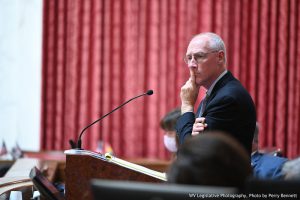 increased 174 percent, failure to appear warrants increased 422 percent, shoplifting increased 52 percent, trespassing charges increased 36 percent, and vacant structure fires increased 400 percent since the number of treatment beds increased.
increased 174 percent, failure to appear warrants increased 422 percent, shoplifting increased 52 percent, trespassing charges increased 36 percent, and vacant structure fires increased 400 percent since the number of treatment beds increased.
The mayor indicated the increase is due to a lack of facility procedures. He stated that when it comes time to leave treatment or if someone is kicked out, they often become part of the city’s homeless population.
House Bill 2459, passed in 2017, exempted the construction and development of drug and alcohol treatment facilities from certificate of need laws. These facilities are also exempt from municipal zoning laws due to substance abuse being classified as a disability. Joyce told the committee that he would like to see residential treatment facilities be put back under the certificate of need rules.
Substance abuse treatment facilities in West Virginia are regulated through the Department of Health and Human Resources’ Office of Health Facility Licensure & Certification.
Committee members also heard from Al Johnson, chief assistant state attorney for Palm Beach County, Florida. Johnson was the leader of a task force that dealt with the growth of unregulated sober houses — homes where a group of individuals live in alcohol and drug-free environments after leaving substance abuse treatment, learning to stay sober, and transition back into society.
In 2017, Florida’s legislature passed a law putting additional regulations on sober homes, requiring background checks for owners and staff of residential addiction recovery organizations, making it a crime to use third parties to find patients for their homes (patient brokering) and criminalizes kickbacks.
Johnson told the committee that his task force found that some sober homes took payments for referrals to treatment centers, bilking insurance companies, and state and federal programs for the costs of drug testing and other services.
West Virginia also passed legislation in 2019 creating a voluntary certification process for recovery residences through organizations, such as the National Alliance for Recovery Residences. Facilities are required to be certified by a third party before being eligible for state funding. The law also prohibits any facility from advertising itself as a certified recovery residence without third-party certification.
Also during the meeting, the committee heard from advocates regarding how best to take advantage of the federal American Rescue Plan to make long-lasting changes to the state’s struggling early childhood education system.
According to Dr. Jamie Jeffrey, a pediatrician and associate clinical professor of pediatrics, WVU-Charleston, and early childhood education advocate, currently, 64 percent of West Virginians live in a child-care desert. Dr. Jeffrey and other advocates testified to the Joint Committee on Health on Sunday, providing recommendations from the “Survive COVID and Thrive Tomorrow Child Care Policy Group.”
For those who do have access to childcare, the average cost for one child for a year is more than the average cost of tuition at West Virginia University. The American Rescue Plan, signed into law March 11, appropriated funding for childcare through three funding streams: two pools of one-time supplemental and stability funds, and a new permanent fund. West Virginia is set to receive more than $260 million.
The coalition has five main recommendations.
First, support families by raising the income eligibility to receive child-care subsidies.
Second, the coalition suggests paying child-care providers based on children’s enrollment versus daily attendance.
Currently, most providers are paid only if a child attends. That means if a child is sick, the center gets no payment, but the teacher in the classroom still goes to work and needs to get paid.
This goes in line with providing more support for higher salaries for child-care workers. The average child-care worker is paid $10 an hour, which is a hard sell for most employees, but especially those with early childhood education bachelor’s degrees.
The coalition also wants to incentivize higher tiers of service provided and provide funds to expand existing facilities and build new ones.
Joint Committee on Flooding 9/12/2021
The Committee heard updates from HUD about several programs including Bridge Home Program and Multifamily Housing Program. The Bridge Home Program helps reconstruct or rehabilitate privately owned bridges that provide access to a primary residence. Top priority is given to citizens who are being severed by the WV Housing restoration program. The program will construct 42 bridges once the final 13 are completed. The program has a remaining $3.5 million in the budget to complete projects.
The Multifamily Housing Program provides housing to vulnerable households by offering to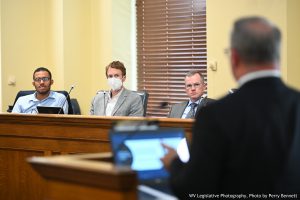 repair rental housing or construct new multifamily rental housing developments in the four Most Impacted and Distressed (MID) disaster declared counties. Those counties are Clay, Greenbrier, Kanawha, and Nicholas. Three projects with 127 multifamily rental units are being completed and two projects have received authorization to use grant funds.
repair rental housing or construct new multifamily rental housing developments in the four Most Impacted and Distressed (MID) disaster declared counties. Those counties are Clay, Greenbrier, Kanawha, and Nicholas. Three projects with 127 multifamily rental units are being completed and two projects have received authorization to use grant funds.
An analysis of the impact that hazards have on the State serves as a data-driven basis for mitigation program decisions. There are three main areas of focus: Infrastructure Needs, Critical Facilities, and Planning.
Another program the committee heard about is the RISE Demo Program. This program helps structures damaged in the June 2016 flood disaster. The structures must be vacated and in one of the 12 disaster counties. Of the program funds, 80% must go to one of the four MID counties, and 20% is spent in the Fayette, Jackson, Monroe, Lincoln, Pocahontas, Roane, Summers, and Webster.
The RISE program is not a program to replace any damaged home, an acquisition program, or a FEMA program. Also, counties and municipalities cannot address blighted structures through the RISE Program unless they are the owner of the structure. RISE cases may be closed for several reasons, including the owner didn’t submit an application, unresolved issues and liens, the property has a deed of trust and probate.
Moving forward, the program has 46 more demolition projects. With the current budget, the total completed projects will be 72 demolitions. The total funding for the program is $5.8 million. As of August 31, 2021, $3.5 million had been spent. The remaining funds have been committed to the remaining 14 projects.
HUD monitors CDBG-DR RISE WV and it found there was duplication of benefit analysis was not conducted by the WVNG and applicants did not sign the subrogation contract. Another concern was that the damage verification forms were not tied back to the June 2016 disaster with one defined officer signing off. Moving forward the department plans to address these issues. The department also requested a reallocation of $1 million.
The committee also heard from the State Resilience Office. The office has experienced a transition as the deputy director became the director. The office is looking to hire a deputy. The office continues to have monthly calls for information sharing. The office has several projects going on.
Joint Legislative Oversight Committee on DOT Accountability 9/12/2021
The Committee heard from the Department of Transportation. The DMV has more functions than just motor vehicle functions. Some of those include insurance, child support, and education.
During the COVID-19 shutdown, appointments were available at the DMV. Some offices have continued to offer appointments to benefit customers. While others do not have an appointment, they have made the decision not to because they can see more customers without appointments.
The DMV is working on an updated version of the website and offering more online services. They are hoping to offer more digital items, including paperless titles, mobile registration cards, and mobile driver’s licenses.
The Parkways Authority handles the WV Turnpike Maintenance including tolls, detachments, welcome center, and more. The summer traffic update between Memorial Day and Labor Day is 2% higher than in the summer of 2019. The tolls had 12.4 million transactions.
Construction continues several parts of I-64. The Beckley barrier walls are set to come down in late September, ahead of schedule. There will be new signage and the area will be well lit and widened.
Parkways plans to have system upgrades for the tolls, which included CCS and possibly third-party applications “pay to play.” There will also be license plate cameras in all lanes, which will allow tolls to be opened for an hour or two and then bills to be sent to people who come through. The hope is that this will reduce no pay violations.
Joint Legislative Oversight Commission on State Water Resources/Select Committee on Infrastructure 9/12/2021
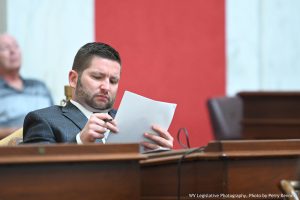 The committee heard from the Public Service Commission and the Water Development Authority. Lack of water and sewer is a major issue in several areas of West Virginia. The PSC is hoping to expand services to underserved areas. The PSC wants to consolidate smaller utilities to help provide more services to those areas. The Water Development Authority deals with more than water.
The committee heard from the Public Service Commission and the Water Development Authority. Lack of water and sewer is a major issue in several areas of West Virginia. The PSC is hoping to expand services to underserved areas. The PSC wants to consolidate smaller utilities to help provide more services to those areas. The Water Development Authority deals with more than water.
Select Committee on PEA, Seniors, Long Term Care 09/13/2021
The Committee heard from the Public Employees Insurance Agency during Monday’s meeting. PEIA insures 170,000 active employees or dependents and 63,000 retirees or dependents. Most insured individuals are state employees, employees of county boards of education, or higher education employees.
The agency provided a financial overview. Active employee expenses total $720,000,000 with $582,000,000 being used for state fund employees and $138,000,000 for non-state agencies. Retiree expenses total $213,000,000.
Joint Standing Committee on the Judiciary 09/13/2021
The Committee heard a presentation on data relating to bail bond reform. The Division of Corrections and Rehabilitation presented. According to the WVDCR, 48 percent of inmates are arrested after hours, while 27 percent are arrested during normal business hours and 25 percent are arrested on the weekend. The length of stay for inmates released on bond in July and August of 2021 was 3 days for non-violent offenders and 4 days for violent offenders.
The agency is making strides to use video hearings. Before COVID-19, Polycom video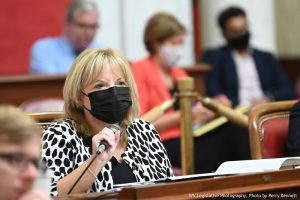 conferencing units were only used to conduct arraignments and parole hearings with trials being handle through inmate transports. Since the COVID-19, the agency had provided each jail with laptops to be used for video hearings. Many types of court proceedings are carried out through video conferencing.
conferencing units were only used to conduct arraignments and parole hearings with trials being handle through inmate transports. Since the COVID-19, the agency had provided each jail with laptops to be used for video hearings. Many types of court proceedings are carried out through video conferencing.
Staffing remains an issue in regional jails. Since COVID, vacancies have increased. Businesses with more competitive pay make it difficult to retain corrections officers. All prison staff is trained to supervise dorms of inmates. Everyone is trained at the academy regardless of the job role. This has allowed administrators to fill in for callouts.
Joint Standing Committee on Finance-9/13/2021
Revenue Secretary Dave Hardy told the committee Monday that the state’s Rainy Day Fund will have a balance exceeding $1 billion later this week for the first time in its history. State lawmakers created the Rainy Day Fund in 1993.
 According to Hardy, the previous Rainy Day Fund high was $955 million on June 30, 2014. He mentioned that this milestone will be impressive to those that rate the state’s credit.
According to Hardy, the previous Rainy Day Fund high was $955 million on June 30, 2014. He mentioned that this milestone will be impressive to those that rate the state’s credit.
State law requires half of any budget year surplus to be placed in the Rainy Day Fund. Hardy said $15.4 million of the $30.8 million surplus on June 30 was recently deposited.
In addition to the Rainy Day fund update, Hardy also reported the state’s Income Tax Reserve Fund, which is used to get tax refund payments out quickly, now has a record balance of $49 million. All $23 million that was previously in the fund was spent during the early months of the pandemic in 2020.
The state’s budget also continues to be bolstered by an enhanced Medicaid match from the federal government. The match was increased by 6 percent several months ago to help states with reimbursements during COVID. Hardy confirmed the increase remains in place.
Also in the meeting, State Deputy Revenue Secretary Mark Muchow told lawmakers the price of natural gas has increased from a low of $1.03 to $3.63 per million BTU, which is helping drive up severance tax collections in West Virginia.
Two months in the fiscal year the state has collected $49.3 million in severance tax revenue. It was just $4 million at the end of August last year.
Muchow highlighted that the natural gas price increases also help coal, as a cheaper means for power generation. Coal prices have increased by $10 a ton from a year ago and Muchow predicted Monday those prices are likely to go higher. He said the markets for both metallurgical coal and steam coal markets are steadily bouncing back.
Joint Committee on Children and Families-9/13/2021
Kendra Boley-Rogers, program director with the Department of Health and Human Resources Bureau for Social Services, updated the committee regarding the state’s response to human trafficking.
Boley- Rogers emphasized that more training is needed to help West Virginia child welfare workers identify human trafficking and more support is needed for survivors.
The lack of understanding, education, and training can lead to misidentification of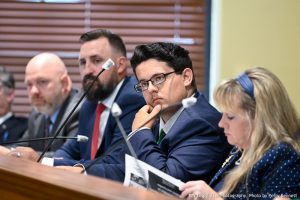 trafficking offenses, which can result in lesser criminal penalties, as well as hindering or delaying victims from getting vital services for trafficking survivors according to Boley-Rogers.
trafficking offenses, which can result in lesser criminal penalties, as well as hindering or delaying victims from getting vital services for trafficking survivors according to Boley-Rogers.
She informed the committee that between Oct. 1, 2017, and Aug. 31, 2021, 70 trafficking referrals were made to DHHR. The victims ranged in age from 1 to 18 years old.
Only four of those 70 referrals were substantiated, with approximately eight cases still pending. One was labor trafficking, a case of a man taking advantage of three immigrant children.
Boley-Rogers mentioned that sometimes those in child welfare and the general population envision a Hollywood movie version of human trafficking perpetrated by strangers. Evidence from the confirmed cases in West Virginia suggests it’s often done by someone the child knows and trusts, and often triggered by desperation.
Survivors of trafficking also often don’t know they have been trafficked, she said. This misunderstanding can lead to cases being treated as typical abuse and neglect.
Children in the Child Protective Services system, including trafficking victims, are entitled to an array of services including shelter, food, clothing, and mental health care. However, there is only one therapist in the state that specializes in human trafficking survivor treatment.
DHHR is working on more training for child welfare workers to help them identify human trafficking. A statewide task force is also working on ways to bring more services to West Virginia to assist survivors.
Joint Committee on Natural Gas Development 09/13/2021
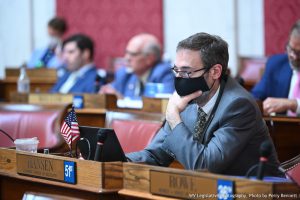 The Committee heard from the Gas and Oil Association. Members of the association employ 32,000 natural gas and oil employees and 13,200 exploration and projection employees. They pay over $5.1 billion in wages and contribute more than $11 million to West Virginia’s economy. Oil rig counts are down compared to previous years and compared to other states. Two possible new pipelines in West Virginia are the Mountain Valley and the Atlanta.
The Committee heard from the Gas and Oil Association. Members of the association employ 32,000 natural gas and oil employees and 13,200 exploration and projection employees. They pay over $5.1 billion in wages and contribute more than $11 million to West Virginia’s economy. Oil rig counts are down compared to previous years and compared to other states. Two possible new pipelines in West Virginia are the Mountain Valley and the Atlanta.
The Capitalization Rate has significantly decreased with the tentative rate of 2022 to be set at 10.8 percent, which suggests that the oil and gas market is more stable than it is. The State Tax Department and a member of the association of assessors, also, presented during the meeting.
Joint Committee on Government Organization-9/13/2021
The committee received a regulatory board review report from the West Virginia Legislative Auditor’s Performance Evaluation and Research Division that recommended eliminating the board that licenses dietitians in West Virginia.
State code requires reviews of all state regulatory boards at least once every 12 years, and the West Virginia Board of Licensed Dietitians was up for review this year.
In the review, the Legislative Auditor’s Office recommended eliminating the Board of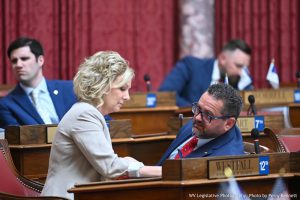 Licensed Dietitians, deeming the board duplicative. Auditors said the Board of Licensed Dietitians mirrors what the National Commission on Dietetic Registration already does.
Licensed Dietitians, deeming the board duplicative. Auditors said the Board of Licensed Dietitians mirrors what the National Commission on Dietetic Registration already does.
Auditors concluded that the Legislature could simply codify title protection for licensed dietitians and nutritionists by statute, requiring that dietitians be licensed through the National Commission on Dietetic Registration.
If the Legislature chooses not to eliminate the Board of Licensed Dietitians, auditors recommend the Legislature consider defining more specific practices in defining the scope of proactive for the board, requiring the board to maintain a database of dietitians and nutritionists in the state, ensure it handles complaints, and improve its website.
In a written response to the Legislative Audit report, the board said it believes strongly that a state-level agency is needed to monitor dietitians and nutritionists. The board said its elimination would “wreak immediate havoc” on healthcare policy in West Virginia.
Legislative Oversight Commission on Education Accountability 09/14/2021
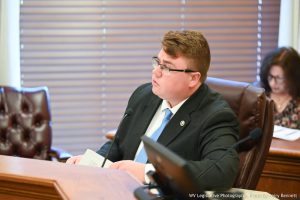 The committee heard from higher education with an update on COVID-19. The goals for 2021 and 2022 are to overcome vaccine hesitance, provide vaccines on campus, monitor quarantine and isolation spaces, provide rapid testing in case of a surge. Schools are working with local health departments, primary care facilities, and hospitals to combat COVID on WV campuses. Colleges and universities are following CDC guidelines that only unvaccinated people must quarantine. Currently, all campuses have the capacity for on-campus quarantine. WVU has seen a drop in quarantine due to efforts to encourage mask use and vaccines. The Delta variant is present on WVU’s campus.
The committee heard from higher education with an update on COVID-19. The goals for 2021 and 2022 are to overcome vaccine hesitance, provide vaccines on campus, monitor quarantine and isolation spaces, provide rapid testing in case of a surge. Schools are working with local health departments, primary care facilities, and hospitals to combat COVID on WV campuses. Colleges and universities are following CDC guidelines that only unvaccinated people must quarantine. Currently, all campuses have the capacity for on-campus quarantine. WVU has seen a drop in quarantine due to efforts to encourage mask use and vaccines. The Delta variant is present on WVU’s campus.
The WV Department of Education provided a report on virtual learning in the state.
The committee received a report on Vison 2025: The West Virginia Science and Technology Strategic Plan. The Plan has been revised with goals to being research development to the state. The Plan is “to launch and attract science and technology companies” in four “high-priority platforms,” including life sciences, computer and data science, advanced manufacturing, and advanced energy.
Legislative Oversight Committee on Regional Jail and Correctional Facility Authority 09/14/2021
The committee received an update from the Division of Corrections and rehabilitation, as well as an overview of the presentation on bail bond reform.
Regional Jails have saved the counties money in jail fees by shifting fees to the state.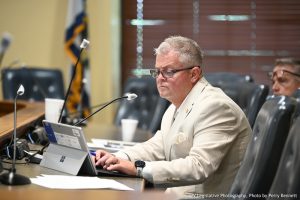 Regional Jails are struggling to hire due to businesses offering higher pays with less stressful jobs. Higher wages in other states are also an issue for retaining COs, especially in the eastern panhandle. Maryland offers a higher starting salary than West Virginia. Jails remain overcrowded.
Regional Jails are struggling to hire due to businesses offering higher pays with less stressful jobs. Higher wages in other states are also an issue for retaining COs, especially in the eastern panhandle. Maryland offers a higher starting salary than West Virginia. Jails remain overcrowded.
One member asked if decriminalizing marijuana would help the overcrowding in the regional jails. The presenter stated that it is difficult to answer because there has been a hole in the date for many years. It was stated that decriminalization would not make marijuana legal. It would remove the criminal offense from it. A person could be ticketed instead of incarnated. More information was requested regarding this data.
Joint Standing Committee on Education 09/14/2021
The Education Committee heard COVID update from higher education. No vaccine mandate is on any campus. Colleges and universities are offering vaccines on campus either through health centers or through local partners. Clinical students must adhere to the same policies as staff at health care facilities. Some health care facilities are requiring vaccines.
All schools have access to contract for COVID testing at a low cost. Of the 15, 2-year campuses 12 test unvaccinated students weekly or monthly. Of the 12, 4-year campuses 11 test unvaccinated students weekly or monthly.
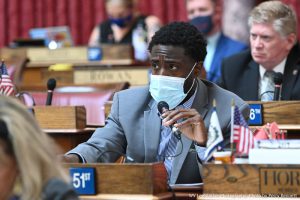 The West Virginia Board of Education presented the minimum graduation requirements for high school students. WV students are required to have 22 credits to graduate: 4 English, 4 Mathematics, 3 Science, 4 Social Studies, 1 Physical Education, 1 Health, 1 Arts, and 4 of the student’s choice.
The West Virginia Board of Education presented the minimum graduation requirements for high school students. WV students are required to have 22 credits to graduate: 4 English, 4 Mathematics, 3 Science, 4 Social Studies, 1 Physical Education, 1 Health, 1 Arts, and 4 of the student’s choice.
The Department of Education presented School Recovery and Guidance in WV Schools. The Department has created a document for guidance and encourages schools to work with local health departments.
Social and emotional wellness is particularly important during the difficult times of COVID-19 and reentry into a classroom environment. Mitigating the spread of COVID-19 is important in the classroom and extracurricular activities. Vaccines are encouraged for those who can receive them. Other mitigating strategies include cleaning and disinfecting, hand hygiene, face coverings, social distancing, and contact tracing.
Quarantine guidance has been provided. Only students who have not been vaccinated are required to quarantine. Students have two options for quarantine. They can quarantine for 10 days without testing if no symptoms have been identified. The other option is students can be tested and only quarantine for 7 days if they receive a negative result.
Joint Committee on Government and Finance-9/14/2021
The committee received updates Tuesday on the progress of broadband expansion efforts from Mitch Carmichael, secretary of the Department of Economic Development.
Carmichael said the state has several pending federal grant applications for broadband programs.
He highlighted one of those programs, the FCC’s Emergency Connectivity Fund (ECF). The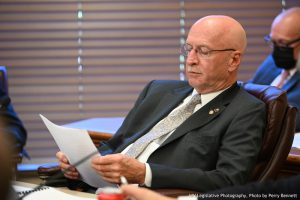 $7.17 billion project will allow public schools and libraries to offer Wi-Fi hotspots for students to take home to access broadband. The program also covers reasonable costs for laptops and tablet computers, as well as modems and routers.
$7.17 billion project will allow public schools and libraries to offer Wi-Fi hotspots for students to take home to access broadband. The program also covers reasonable costs for laptops and tablet computers, as well as modems and routers.
Last year, amid the pandemic, the state used federal CARES Act funds to start WV Kids Connect, installing Wi-Fi hotspots at schools, colleges, libraries, and state parks to provide students a location to access the internet while many schools were on remote learning due to COVID-19.
Another program, called the Emergency Broadband Benefits program, provides $50 per month to subsidize broadband service for families with income at or below 135% of the federal poverty guidelines. The program also provides up to $100 for a desktop computer, laptop, or tablet if recipients can contribute between $10 and $50 towards the purchase price.
The Department of Economic Development is leading the state’s effort at broadband expansion and working to coordinate between internet service providers, and state, county, and municipal governments.
Carmichael explained that more than $362.1 million was awarded to nine internet service providers in West Virginia for phase I of the FCC’s Rural Digital Opportunity Fund.
Phase I is focused on extending internet service to unserved parts of the state. West Virginia is set to receive $138 million for broadband expansion through President Joe Biden’s American Rescue Plan.
According to Carmichael, the state can also use part of the $1.355 billion it’s receiving through the American Rescue Plan for infrastructure projects, such as broadband expansion. Counties and cities are receiving a combined $679 million through the Biden plan that can also be used for broadband projects. Another $100 billion in broadband investment has come from various grants and loans through the Appalachian Regional Commission and the U.S. Department of Agriculture.
Legislative Oversight Commission on Health and Human Resources Accountability 09/14/2021
The committee received a report from the Department of Health and Human Resources on the Abuse and Neglect of Disabled West Virgoans in Care Settings. According to DHHR, WV has experienced an extremely high number of individuals with intellectual and developmental disabilities suffering from abuse and neglect, some of which have led to serious injury or death.
The abuse has occurred in three settings: Intensively Supported Settings (ISS), group homes with four or more consumers, and Intermediate Care Facilities for Individuals with Intellectual Disabilities (ICF/IID).
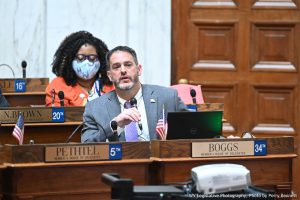 Documented issues in these settings include critical medication errors, failure to provide emergency medical attention, failure to secure dangerous substances, failure to activate door alarms, lack of staffing, abuse and neglect by staff, failure to report or investigate incidents, correct deficient practices, and provide training, and failure to provide appropriate basic nutrition.
Documented issues in these settings include critical medication errors, failure to provide emergency medical attention, failure to secure dangerous substances, failure to activate door alarms, lack of staffing, abuse and neglect by staff, failure to report or investigate incidents, correct deficient practices, and provide training, and failure to provide appropriate basic nutrition.
DHHR has continued to take several actions included surveying and regulating settings, closing facilities, and engaging stakeholders to develop recommendations. DHHR recognizes there is a labor shortage issue. The agency agrees with the proposed concept of a tiered Core Staffing Model. The agency hopes to use various funding to address staffing shortages.
The West Virginia Behavior Healthcare Providers Association presented an overview of meetings regarding the mental hygiene reform. Stakeholders working on Mental Hygiene Reform include the WV Supreme Court, DHHR, the WV Behavior Healthcare Providers Association, WV Hospital Association, the sheriff’s department, Public Defenders Services, Disability Rights of WV, several hospitals, the City of Charleston, and the WV Legislature.
Mental Hygiene is the civil court process where someone, due to mental illness, can be placed and secured involuntarily in a treatment facility for mental illness. This is sometimes referred to as involuntary commitment or civil commitment. There are several issues with the process including timeliness, lack of uniformity, medical clearance, and transportation.

